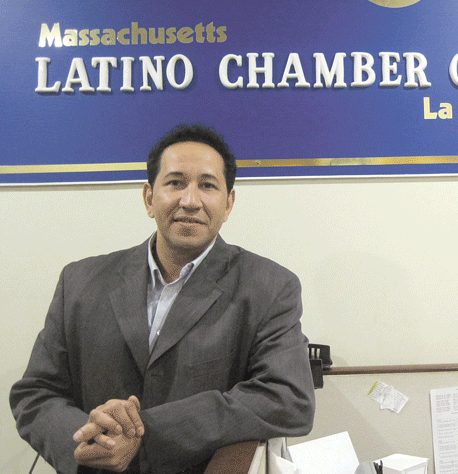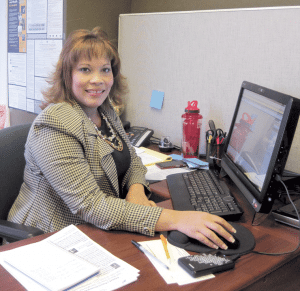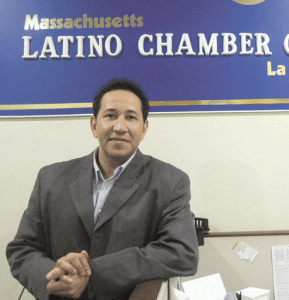
Getting Down to Business
Latino Chamber Continues to Expand Its Programs

The Massachusetts Latino Chamber of Commerce helped Deborah Roque channel her entrepreneurial spirit; she now owns two small ventures.
But she always had a desire to be in business for herself, and today, she has not one, but two entrepreneurial ventures that vie for her time. Most of the hours are devoted to Roque Neighborhood Tax Services, which provides bookkeeping, payroll, notary, and other services to individuals, small businesses, and a few larger corporations. On weekends, though, she commits significant amounts of time and energy to Aponte-Roque’s Shoes & Accessories, an online store that promotes itself with the slogan “Where the fashion is always notable.”
Roque’s tax service is located at 1655 Main St., Suite 505 in Springfield. That’s one of the offices within an incubator facility operated by the Massachusetts Latino Chamber of Commerce (MLCC), which opened its doors in 2004. Since it was launched three years ago, the incubator has helped dozens of small, minority-owned businesses get off the ground, said Carlos Gonzalez, president of the MLCC.
And that’s just one of a host of services the organization now offers, he said, listing everything from advocacy to technical assistance for small businesses; from networking events to programs designed to help area companies connect with — and do business with — the large and growing minority population in Western Mass.
Such efforts are part of what Gonzalez called “bridge-building work” between the Anglo (majority) population and the region’s minority groups.
“As the Latino community continues to grow, it needs to recognize that the Anglo community is an economic opportunity,” he explained. “And the Anglo community obviously needs to recognize that the growth of the Latino community is definitely an economic opportunity. So we need to bridge those gaps.”

Carlos Gonzalez says that fostering entrepreneurship has become one of the highest priorities for the Latino Chamber.
He told BusinessWest that, while the name is the Latino chamber of commerce, the organization serves a number of “minority” groups, including women, African-Americans, and a growing number of Asians and Russians in the Greater Springfield area. And he expects the MLCC’s role within the state’s business community to continually expand, as those minority populations increasingly become the majority, which they already have, by most all accounts, in Springfield, and were long ago in Holyoke, Lawrence, and other communities.
“Our membership has started to change … we’re becoming more of what I would call an ethnic chamber, or minority chamber,” he explained. “We have many women-owned businesses, many non-Latino, and even non-minority owned business owners coming to our seminars and networking events.”
He attributes this growth and diversification to the strong lineup of educational programs offered by the MLCC, as well as the myriad success stories it has helped script.
For this, the latest segment of the Getting Down to Business series, BusinessWest turns the spotlight on the MLCC and the many programs it offers to a diverse population that is becoming an ever-more-powerful force in the regional and state economy.
Work in Progress
Gonzalez told BusinessWest that there are many within the Latino community — and other minority groups — that share Roque’s entrepreneurial drive.
For some, business ownership is a dream, a passion they’ve pursued for years, he explained, noting that, for many others, it is simply their best option for making a living.
“Considering the unemployment crisis and the lack of job opportunities in this region, the only way to find economic solutions for many people in the inner city, particularly within the minority population, is for people to start their own businesses,” he explained. “And every small business is potentially creating revenue for 1.5 people.”
Helping individuals take business ventures from their kitchen table to the incubator in downtown Springfield, and often well beyond, has become one of the signature services provided by the MLCC, which has certainly grown and evolved since it was launched nearly a decade ago.
It was a vision cultivated by Gonzalez, who had spent years in government (specifically, the Springfield mayor’s office as an aide) and also in business — he operated a Spanish-speaking radio station. The simple goal at first was to create an organization that would help combat poverty by assisting members of the Latino community and other minority populations succeed in the modern workplace, as employers and especially as business owners.
“I saw a lot of people, particularly in the Latino community, with a strong interest in entrepreneurship, but there were few resources to meet their cultural and language necessities,” he said by way of explaining the genesis of the MLCC. “The minority population was growing in Springfield, and entrepreneurship was a key area that no one was targeting.”
The plan — one that has largely been adhered to — was to start in Springfield and expand into areas, especially urban centers, where the Latino community was growing or already sizeable. Holyoke and Lawrence were natural landing spots, said Gonzalez, adding that Worcester is the next logical point of expansion, with a facility due to be operating by the end of this year.
In each community where the MLCC has established a presence — and in all the communities it serves through those offices — the emphasis has been providing members and those served with the tools to succeed, whether that be in the workplace or a business owner, and education has been at the heart of those efforts.
“Education and training was, is, and will always be the heart and soul of our chamber,” he told BusinessWest, “We’re not only a chamber that does networking — we actually do education and training on site.”
Over the years, the MLCC has greatly expanded its roster of services, always with the goal of providing the necessary tools for success, whether it be in the workplace or, increasingly, with small entrepreneurial ventures. Offerings now include:
• Small-business technical assistance, which comes in many forms, with programs tailored to the needs of specific constituencies and provided in conjunction with a host of partners, including other chambers and economic-development-related agencies;
• Lending to Success, a business-lending technical-assistance program that offers loan assistance, business plans, financial plans, and marketing strategies to successfully access capital for startups and growing businesses. The MLCC provides mentoring in legal, accounting, and marketing activities to support businesses through the growing process;
• The Alliance/Alianza Contractor Development Program, which helps foster procurement, contracting, and employment opportunities in the construction trade industry between women and minority small businesses and government and corporate entities;
• The Estes Conectado Technology Program, a full-service computer laboratory that provides technology education to help participants become more proficient in the use of technology, especially as it relates to business operations, reducing costs, and improving time management;
• The La Academia Program, a workforce and skill-development program that provides an introduction to making musical instruments, cabinetmaking and refinishing, sewing, basic computer skills, conversational Spanish classes, management training, and more;
• Advocacy on policy issues that effect the business community, such as local, state, and federal procurement regulations, taxes, small-business programs, and other areas; and
• Youth and leadership programs, including a Leaders of Tomorrow program that provides leadership training for youths through mentoring, public speaking, and community involvement, as well as a business seminar for young people ages 7-16, at which they can learn about everything from basic banking skills to starting a small business to keeping financial records.
Taking Flight
But arguably the most successful initiative has been the small-business incubator center, which offers office space, conference rooms, an Internet computer lab and training room, and, most importantly, mentoring and other forms of assistance to help businesses get off the ground and to the proverbial next stage.
Gonzalez told BusinessWest that the current list of 20 registered businesses that share space in the incubator includes everything from Roque’s tax-service operation to a few accountants and lawyers; from photographers to a pizza restaurant located on the ground floor of the building. And while most are Latino-owned, there are some started by African-Americans, Russians, and other ethnic groups.
The common denominators are an entrepreneurial spirit and a need for physical space and technical assistance that will enable that spirit to flourish.
Roque took a path that would be considered typical among those who have participated in the program, said Gonzalez, adding that she started her venture in her home, moved into shared space in the incubator, and now occupies her own office at 1655 Main St.
“I always wanted to own my own business,” she told BusinessWest, adding that the MLCC helped her make the transition from her home, where she worked for several years to establish a client base, to her downtown Springfield facility.
Today, many of her clients are small-business owners themselves, people who know the specific field they’ve chosen, but usually not the payroll, bookkeeping, and other duties that are part and parcel to owning a business, so they’ve turned to her for assistance. “It’s very rewarding work, and each day is different,” she said, dispelling some perceptions about the work she does. “I enjoy working with small businesses.”
While the incubator in Springfield has been the scene of many success stories, the MLCC has helped inspire and then write entrepreneurial success stories in many other communities with large minority populations, including Holyoke and Lawrence, where MLCC efforts have helped that city, in which 80% of the population is Latino, gain statewide recognition as a minority business hub.
In the Paper City, the chamber has been working closely with Mayor Alex Morse and his administration to help get many new businesses off the ground and, in so doing, create momentum and fill vacant storefronts and office space at the same time.
Among the initiatives is what Gonzalez called a “healthy-food restaurant” to be opened downtown that will also serve as a training ground for entrepreneurs across the area looking to get into the food industry.
“Mayor Morse has been very supportive of new approaches to entrepreneurship and training,” said Gonzalez. “We’re looking to fill empty storefronts with a new entrepreneurship spirit that’s being cultivated by the mayor, the data center, and a new arts center going in the downtown, and an urban-renewal plan that’s been designed to connect the Latino-populated neighborhoods with the core of the city.
“We’re excited about what’s going on in Holyoke right now,” he continued. “They’re really thinking outside the box, and they’re allowing entrepreneurship to be part of the overall solution to bringing back Holyoke.”
Minority Report
As he talked about the MLCC’s work in the many urban areas it serves, Gonzalez mentioned some new initiatives. They include work in Holyoke to help entrepreneurs leverage the Massachusetts Green High Performance Computing Center, which will open its doors soon; efforts in Springfield to prepare minority populations for the coming of the casino era; and programs in several communities involving business opportunities in the emerging ‘green’ energy and biosciences sector.
They provide clear evidence that, while the Latino Chamber’s basic role hasn’t changed, the specific ways in which that mission is carried out will continue to expand and evolve.
And they will always be centered on people like Deborah Roque, who have dreams and aspirations — and the need for some assistance when it comes to making them reality.
George O’Brien can be reached at [email protected]





